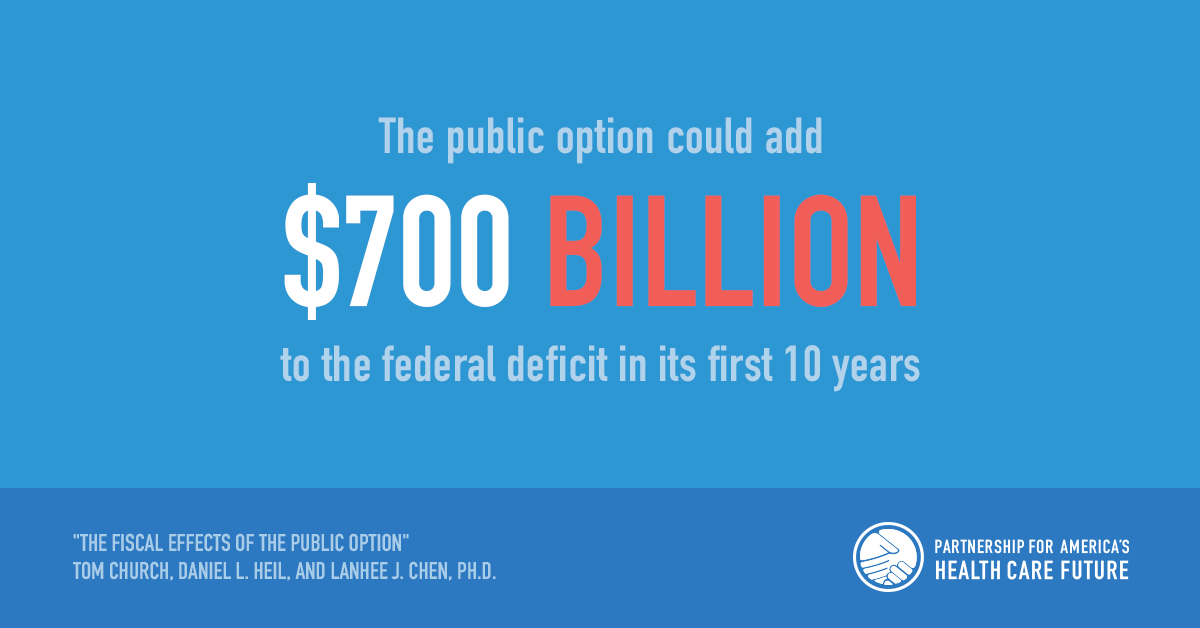New Study: The Public Option Could Cost American Families $700 Billion

New Government-Controlled Health Insurance System Could Burden Americans With Unaffordable Costs And Could Require Higher Taxes On American Families
WASHINGTON – A newly released study by Tom Church, Daniel L. Heil, and Lanhee J. Chen, Ph.D. of the Hoover Institution with support from the Partnership for America’s Health Care Future reveals a new government-controlled health insurance system known as the public option “could require tax increases on most Americans, including middle-income families” and could “add over $700 billion to the 10-year federal deficit, with dramatically larger losses in subsequent years.”
According to the study, “a politically realistic public option would add over $700 billion to 10-year deficits. By 2049, the plan would increase long-run debt projections by 30 percent of GDP or require tax increases equal to nearly 20 percent of projected income tax revenue. These tax increases may affect even middle-income taxpayers, raising their marginal income tax rates by several percentage points.” This would make the public option “the third largest line item on the federal budget, behind only Medicare and Social Security.”
In addition to burdening American families with unaffordable new costs, the study adds that “a public option would significantly disrupt the healthcare market. Widespread enrollment would pose significant challenges to private insurers and healthcare providers, compromising access to care.”
Key Findings:
- A politically realistic public option could lead to a new 4.8 percent payroll tax on American families over 30 years – far higher than the combined Medicare payroll tax Americans pay today.
- Over 30 years, the public option would become the third most expensive government program behind only Medicare and Social Security – both of which are at risk for the seniors who rely on them.
- While proponents try to claim the public option could reduce costs by reimbursing providers at Medicare rates, recent history at both the federal and state levels demonstrates that putting politicians in charge of a new government-controlled health insurance system could lead to higher costs and tax burdens for American families.
- The public option could add as much as $700 billion to the federal deficit in its first 10 years.
“This new study adds to the mounting evidence that new government-controlled health insurance systems like the public option could burden American families with unaffordable new costs,” said Lauren Crawford Shaver, the Partnership’s executive director. “Instead of placing Americans’ health and economic future in the hands of politicians, we should build on what’s working and fixing what’s broken.”
- To read the complete study, CLICK HERE.
- To learn more about the public option, CLICK HERE.
- To learn more about the Partnership for America’s Health Care Future, CLICK HERE.
About the Authors: Lanhee J. Chen, Ph.D. is the David and Diane Steffy Fellow in American Public Policy Studies at the Hoover Institution and Director of Domestic Policy Studies in Public Policy at Stanford University. Tom Church and Daniel L. Heil are research fellows at the Hoover Institution.
About the Partnership for America’s Health Care Future: The Partnership for America’s Health Care Future’s (PAHCF) mission is to build on what’s working in health care and fix what’s not. Every American deserves access to affordable health coverage and high-quality care. Our health care system allows tens of millions of patients and families to receive world-class care delivered by world-class doctors and hospitals. But we can and must do more to ensure health care works for all Americans. That’s why the nation’s leading doctors, nurses, clinicians, community hospitals, health insurance providers and biopharmaceutical companies want to work together to lower costs, protect patient choice, expand access, improve quality and foster innovation. And whether it’s called Medicare for All, Medicare buy-in or the public option, one-size-fits-all health care will never allow us to achieve those goals. That’s why we support building on the strength of employer-provided health coverage and preserving Medicare, Medicaid and other proven solutions that hundreds of millions of Americans depend on – to expand access to affordable, high-quality coverage for every American.
###